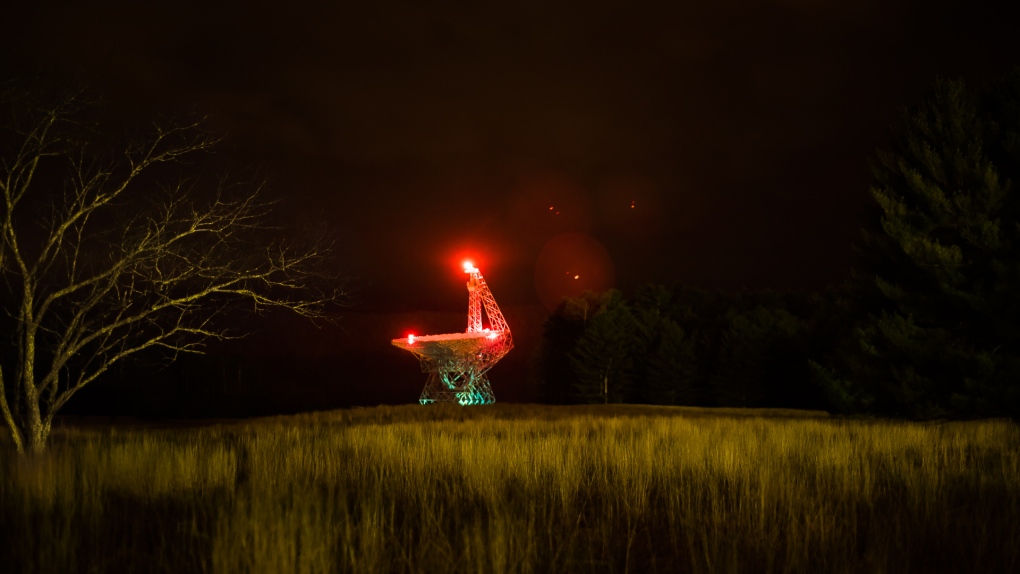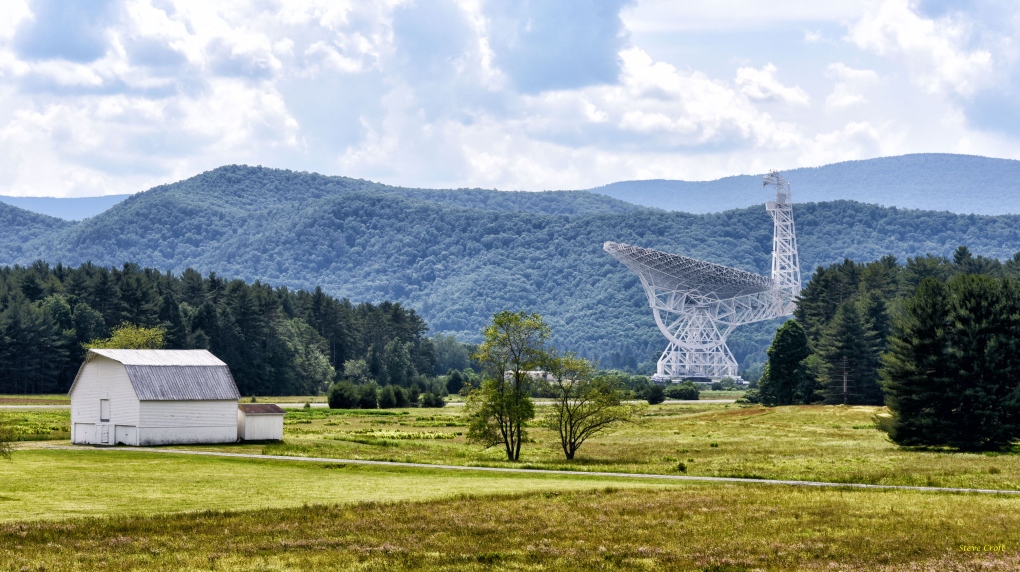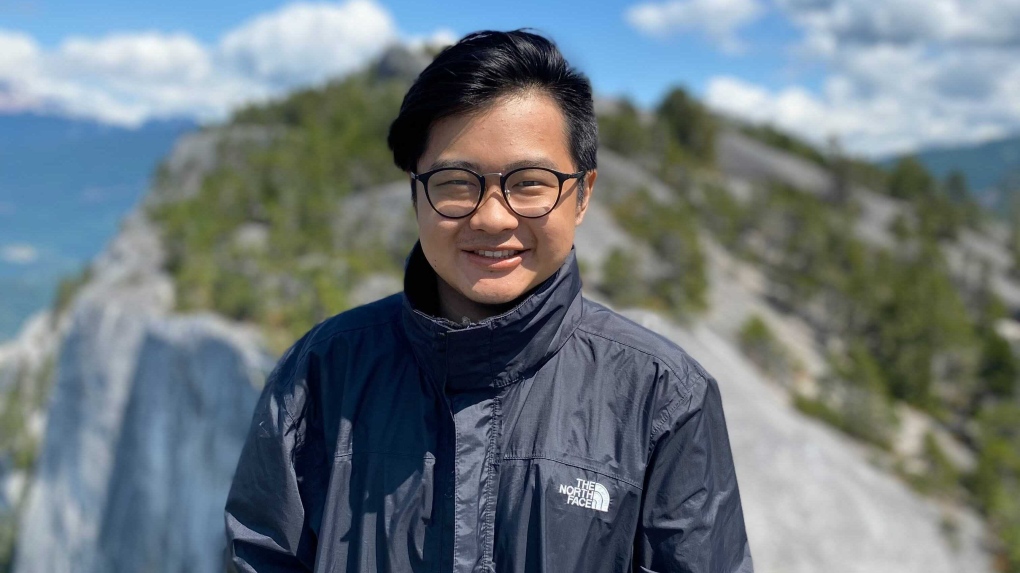Toronto student’s algorithm helps detect radio signals emitting from 5 distant stars
 An element of the Green Bank Telescope used to pinpoint radio signals from space is seen in this undated photograph. (Breakthrough Listen / Chris Schodt)
An element of the Green Bank Telescope used to pinpoint radio signals from space is seen in this undated photograph. (Breakthrough Listen / Chris Schodt)
A new artificial intelligence algorithm created by a Toronto student is helping researchers search the stars for signs of life.
Peter Xiangyuan Ma, a University of Toronto undergraduate student and researcher, said he started working on the algorithm while he was in Grade 12 during the pandemic.
“I was just looking for projects and I was interested in astronomy,” he told CTV News Toronto.
The idea was to help distinguish between technological radio signals created by human technologies and signals that were potentially coming from other forms of life in space.
“What we're looking for is signs of technology that signifies if the sender is intelligent or not. And so unsurprised to us, we keep on finding ourselves,” Ma explained. “We don't want to be looking at our own noisy signals.”
Using this algorithm, Ma said researchers were able to discover eight new radio signals being emitted from five different stars about 30 to 90 light years away from the Earth.
These signals, Ma said, would disappear when researchers looked away from it, which rules out, for the most part, interference from a signal originating from Earth. When they returned to the area, the signal was still there.
“We're all very suspicious and scratching our heads,” he said. “We proved that we found things that we wanted to find … now, what do we do with all these? That's another separate issue.”
- Download our app to get local alerts on your device
- Get the latest local updates right to your inbox
Steve Croft, Project Scientist for Breakthrough Listen on the Green Bank Telescope, the institute whose open source data was the inspiration for Ma’s algorithm, said that finding radio signals in space is like trying to find a needle in a haystack.
“You've got to recognize the haystack itself and make sure that you don't throw the needle away as you're looking at the individual pieces of hay,” Croft, who collaborated on Ma’s research, told CTV News Toronto.
 An image of the Green Bank Telescope is seen here. (Credit Breakthrough Listen / Steve Croft)
An image of the Green Bank Telescope is seen here. (Credit Breakthrough Listen / Steve Croft)
Croft said algorithms being used to discover these signals have to account for multiple characteristics, including the position they are coming from in the sky and whether or not the transmission changes over time, which could indicate if it’s coming from a rotating planet or star.
“The algorithm that Peter developed has enabled us to do this more efficiently,” he said.
The challenge, Croft says, is recognizing that false positives may exist despite a signal meeting this criteria. What could be signs of extraterrestrial life may also just be a “weirdly shaped bit of a haystack,” he added.
“And so that's why we have to go back and look again and see if the signal still there. And with these particular examples that Peter found with his algorithm, the signal was not there when we pointed the telescope back again. And so we sort of can't say one way or another, is this genuine?”
Researchers have been searching the sky for technologically-generated signals since the 1960s, searching thousands of stars and galaxies for signs of intelligent life. The process is called “SETI,” or “the Search for Extraterrestrial Intelligence.”
But interference from our own radio signals has always proven to be a challenge. Croft says most pieces of technology have some kind of Bluetooth or wireless wave element that creates static, resulting in larger amounts of data needed to be collected.
“That's a challenge but also computing provides the solution,” he said.
“So the computing and particularly the machine-learning algorithms gives us the power to search through this big haystack, looking for the needle of an interesting signal.”
Ma said that while we may not have found a “technosignal” just yet, we shouldn’t give up. The next step would be to employ multiple kinds of search algorithms to find more and more signals to study.
 Peter Ma is seen in this photograph taken in 2021. (Adar Kahiri)
Peter Ma is seen in this photograph taken in 2021. (Adar Kahiri)
While the “dream” is to find evidence of life, Ma says he is more focused on the scientific efforts of actively looking for it.
This sentiment is echoed by Croft, who said he is most fascinating in working towards answering the question of whether humans are alone in this universe.
“I don't show up to work every day, thinking I'm going to find aliens, but I do show up for work. So you know, I've got sort of some optimism.”
CTVNews.ca Top Stories

Which Canadian cities have the highest and lowest grocery prices?
Where you live plays a big factor in what you pay at the grocery store. And while it's no secret the same item may have a different price depending on the store, city or province, we wanted to see just how big the differences are, and why.
BREAKING McGill University seeks emergency injunction to remove pro-Palestinian encampment from campus
McGill University has filed a request for an injunction to have the pro-Palestinian encampment removed from its campus.
Swarm of 20,000 bees gather around woman’s car west of Toronto
A swarm of roughly 20,000 bees gathered around a woman’s car in the parking lot of Burlington Centre.
U.S. says Israel's use of U.S. arms likely violated international law, but evidence is incomplete
The Biden administration said Friday that Israel's use of U.S.-provided weapons in Gaza likely violated international humanitarian law but wartime conditions prevented U.S. officials from determining that for certain in specific airstrikes.
'State or state-sponsored actor' believed to be behind B.C. government hacks
The head of British Columbia’s civil service has revealed that a “state or state-sponsored actor” is behind multiple cyber-security incidents against provincial government networks.
Mother assaulted by stranger while breastfeeding baby in her car: Vancouver police
A person was arrested in East Vancouver Thursday after allegedly entering a car while a mother was breastfeeding her four-month-old boy.
Rare severe solar storm Friday could bring spectacular aurora light show across Canada
A rare and severe solar storm is expected to bring spectacular displays of the northern lights, also known as aurora borealis, across much of Canada and parts of the United States on Friday night.
More than half the Canadians once detained in Syrian camps for suspected ISIS family members have returned home
A total of 29 Canadians have been freed from detention camps in northeast Syria and brought back to Canada since human rights advocates began lobbying for their release years ago.
Canada abstains from Palestinian UN membership vote but supports two-state solution
Canada was one of 25 countries that abstained from a United Nations vote on Palestinian membership that passed with overwhelming support on Friday.

































